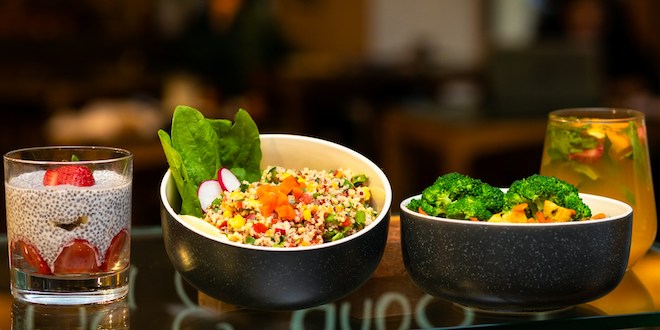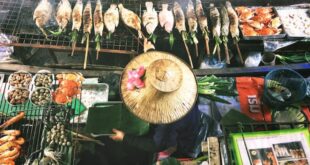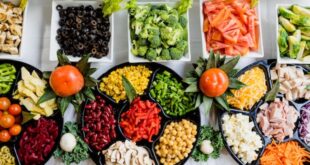Last Updated on May 12, 2024
Traveling as a vegan or vegetarian can be a thrilling journey packed with fresh flavors and discoveries. Nevertheless, finding appropriate food choices in unfamiliar locations can be difficult. As plant-based diets gain popularity globally, the need for vegan and vegetarian dining choices is increasing, even in unexpected places. Exploring these food environments involves combining research, adaptability, and a readiness to welcome new tastes and cooking styles.
Being ready and receptive can result in delightful food finds, whether you’re in busy cities or off-the-beaten-path villages. Exploring plant-based versions of traditional meals and discovering hidden local favorites goes beyond just eating for vegan and vegetarian travelers—it’s also about building connections with different cultures and communities profoundly. This blog post will delve into the details of vegan and vegetarian travel, providing advice and information to enhance your plant-based journeys worldwide.
Exploring Vegan and Vegetarian Food Options
Discovering vegan and vegetarian food choices while on a trip can be a pleasant exploration. Numerous global locations now provide a diverse selection of plant-based meals, including both classic recipes and new, imaginative dishes. In busy urban areas, there are stylish vegan eateries offering tasty meals for various dietary needs. In smaller towns and villages, eateries frequently offer vegan or vegetarian-friendly choices on their menus, showcasing a rising recognition and embrace of plant-based diets.
Looking into food choices before your trip can help you find vegan and vegetarian eateries in the place you’re going to. Online resources and travel applications offer helpful information and reviews shared by other travelers. Nevertheless, do not hesitate to stray from the usual route and visit nearby markets and street food vendors, where you could stumble upon unique finds that provide plant-based meals. Remaining open to sampling different cuisines and tastes is crucial for savoring a wide variety of vegan and vegetarian meals while on your journeys.
For centuries, Buddhist monks in Japan have followed a vegetarian diet, which has resulted in the creation of Shojin Ryori, a traditional vegetarian cuisine that focuses on simplicity, seasonal ingredients, and reverence for all components. This cooking tradition highlights the creativity in plant-based cuisine and also shows the strong spiritual link between food and mindfulness in Japanese culture.
Cultural Considerations and Cuisine Adaptations
Vegan and vegetarian travelers must understand cultural aspects and adapt to local cuisine in order to fully enjoy the diverse food experiences worldwide. By honoring customs and adopting culinary traditions, tourists can savor tasty plant-based dishes while engaging with different cultures.
Cultural Significance: Food plays a significant role in traditions and ceremonies across various societies. Vegan or vegetarian travelers can gain a deeper appreciation for local culinary traditions by exploring the cultural importance of various foods.
Food Fusion: Traditional foods are creatively adjusted to meet different dietary needs due to globalization, causing culinary boundaries to become less distinct. Vegan or vegetarian travelers may encounter intriguing fusion dishes merging local tastes with plant-based ingredients for a delightful culinary journey.
Authenticity and Flavor: Despite changes, many classic meals can be easily adapted to vegan and vegetarian diets while maintaining authenticity and flavor. From revered vegetable stews to tasty grain-based dishes, there are countless plant-based variations on classic classics.
Respectful Engagement: When discovering various cuisines, vegan and vegetarian tourists should be mindful of local eating customs. Travelers can promote cultural interchange and mutual understanding by appreciating traditional foods while adhering to personal dietary preferences.
Vegan and vegetarian tourists can enrich their culinary experiences by integrating cultural considerations and cuisine adaptations while recognizing the world’s unique eating traditions.
Few people are aware, but the very first documented recipe is actually for a vegetarian meal. This ancient lentil stew recipe, originating from Mesopotamia around 1700 BCE, showcases the long tradition and popularity of plant-based food. This exciting fact showcases the widespread popularity and flexibility of vegetarian food across various eras of human existence.
Inclusive Travel
Inclusive travel aims to ensure that everyone, regardless of their dietary choices or personal identities, feels accepted and valued when visiting unfamiliar places. This involves making spaces that meet various requirements, such as offering vegan and vegetarian food choices. As more businesses and travel agencies work to accommodate a range of dietary needs and preferences, there has been a growing recognition in the travel industry lately of the importance of inclusion.
In addition to dietary needs, inclusivity in travel also involves making sure people feel secure and encouraged to show their true identities. This refers to individuals in the LGBTQ community who could encounter specific obstacles and issues during their travels. By cultivating an inviting and accepting atmosphere, travelers have the opportunity to make genuine connections and establish friendships with individuals from diverse backgrounds. When traveling, individuals in the LGBTQ community can meet a gay with this app and connect in a secure online space.
Navigating Challenges
Beginning a journey as a vegan or vegetarian traveler offers new culinary experiences and challenges to navigate. Decoding menus in other languages and understanding diverse food customs can be seen as challenges that lead to personal development and new experiences. By gaining knowledge and preparing strategies to overcome challenges, vegan and vegetarian travelers can start their journeys feeling confident and excited.
Language Barriers: Communication difficulties can arise when trying to express dietary preferences in countries with language barriers. Learning basic phrases or having a translated card to communicate your dietary needs in the local language can be beneficial.
Limited Options: Vegan and vegetarian food selections could be scarce or unusual in specific areas. To find fresh fruits, veggies, and other plant-based foods to prepare at home during these kinds of events, you might want to check out your neighborhood markets or grocery stores.
Cultural Differences: Recognizing and honoring cultural differences is crucial for addressing food challenges. While certain societies may lack a history of vegan or vegetarian meals, they frequently offer dishes that can be easily modified to accommodate those dietary choices
Unfamiliar Cuisines: Exploring new foods can feel daunting, yet it presents a thrilling chance to encounter different tastes and meals. Remain open to trying local specialties, and feel free to inquire about ingredients and how the dishes are made.
The experience of vegan and vegetarian travel is more than just the places explored or the meals enjoyed—it’s about the ability to navigate challenges and adjust as needed. Vegan and vegetarian travelers can strengthen their bond with the world by viewing challenges as chances to learn and develop. By conquering each challenge, such as maneuvering through a busy food market or expressing dietary needs in a new language, explorers develop a deeper respect for the diverse world of food and traditions. As you begin your upcoming plant-based journey, keep in mind that happiness can be found not just at the end but also along the way.
Sustainable Choices
Choosing sustainable options during travel can benefit the environment and the communities in the area. Choosing plant-based meals not only promotes the ethical treatment of animals but also lowers the carbon footprint linked to meat production. Opting for eateries that prioritize sustainability when dining out can also help enhance environmentally friendly efforts. Backing local farmers’ markets not only gives access to fresher ingredients but also aids small-scale producers and cuts down on transportation emissions.
Reducing food wastage is another key element of sustainable tourism. Travelers can minimize food waste by carefully planning meals and portion sizes. Moreover, bringing reusable containers for uneaten food can reduce the amount of disposable plastic waste. Being aware of consumption patterns and intentionally selecting options can have a substantial impact in lessening environmental harm.
Research conducted by the University of Oxford revealed that switching to a plant-based diet can potentially decrease a person’s food-related carbon footprint by as much as 73%. This notable decrease in greenhouse gas emissions showcases the environmental advantages of opting for plant-based meals. This demonstrates that making sustainable food decisions is an effective method to address climate change.
Conclusion
Going on the adventure of vegan and vegetarian travel allows us to discover the world with open minds and adventurous taste buds. Travelers can build enduring relationships and fond recollections by overcoming obstacles, valuing various traditions, and opting for environmentally friendly options. Whether you’re starting your first journey into plant-based eating or preparing for your next cooking adventure, make sure to enjoy every moment and appreciate the diversity of global cuisine and cultures.
Come together with us to support inclusivity, sustainability, and culinary discovery by exchanging your plant-based travel experiences and tips with fellow travelers. Collectively, we have the power to create positive change through each tasty dish we prepare.
 Travel for Food Hub The Food Blog for Travel Lovers
Travel for Food Hub The Food Blog for Travel Lovers
















